Parental Engagement & Children's Learning: A Case Study in Morocco
VerifiedAdded on 2023/06/03
|19
|4232
|171
Report
AI Summary
This report investigates the effects of parental engagement on children's learning, focusing on a case study conducted in Lakhyayta Secondary school in Berrchid town, Morocco. The study uses questionnaires and interviews to gather data from parents, teachers, and school management. The findings reveal that many parents have limited involvement in their children's education due to factors such as illiteracy and occupational commitments. The report highlights the importance of parental support in improving student behavior, attendance, and academic performance. It also discusses strategies for successful parental involvement, including reading with children, assisting with homework, and discussing school events. The research concludes by emphasizing the need for increased awareness and support for parents to enhance their engagement in their children's schooling, ultimately leading to improved educational outcomes.
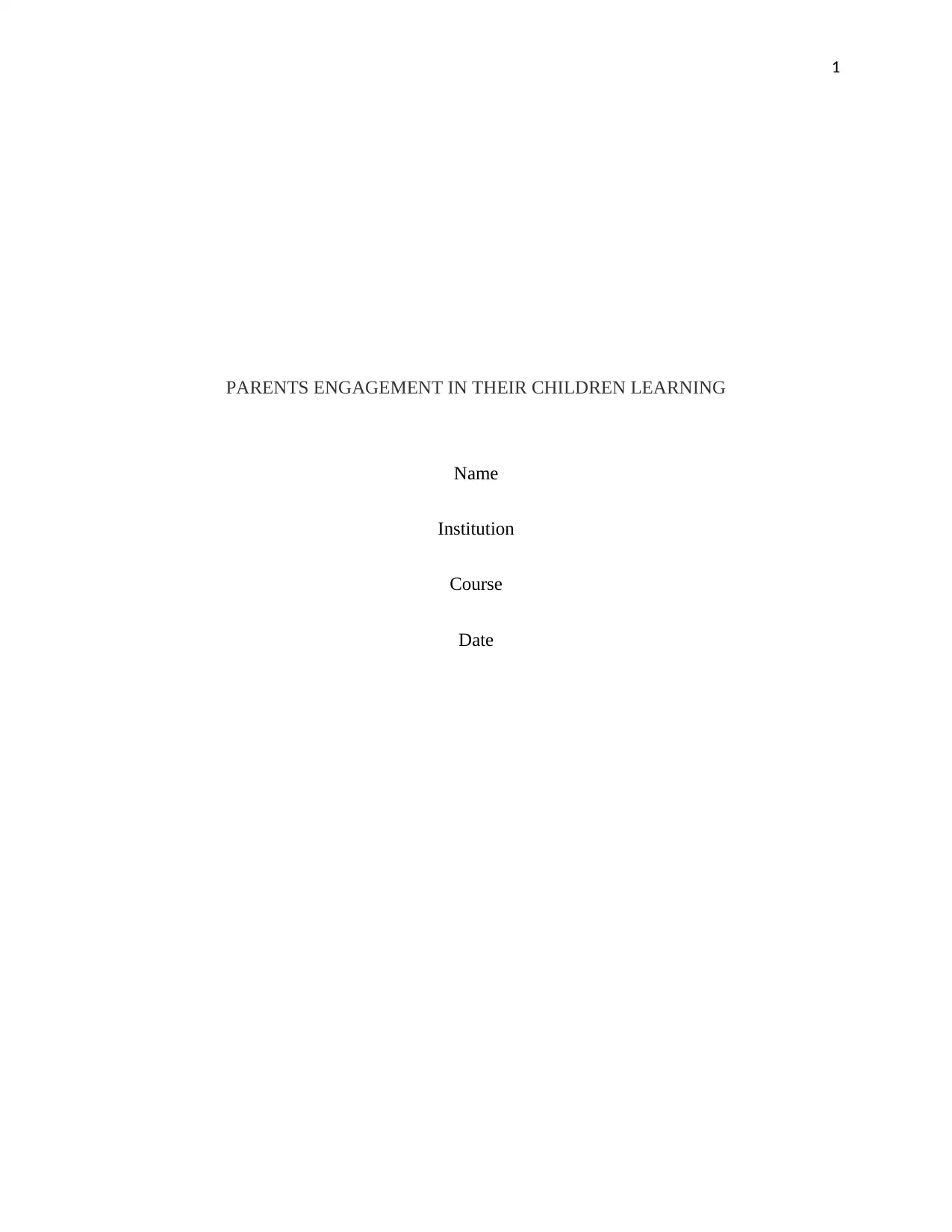
1
PARENTS ENGAGEMENT IN THEIR CHILDREN LEARNING
Name
Institution
Course
Date
PARENTS ENGAGEMENT IN THEIR CHILDREN LEARNING
Name
Institution
Course
Date
Paraphrase This Document
Need a fresh take? Get an instant paraphrase of this document with our AI Paraphraser
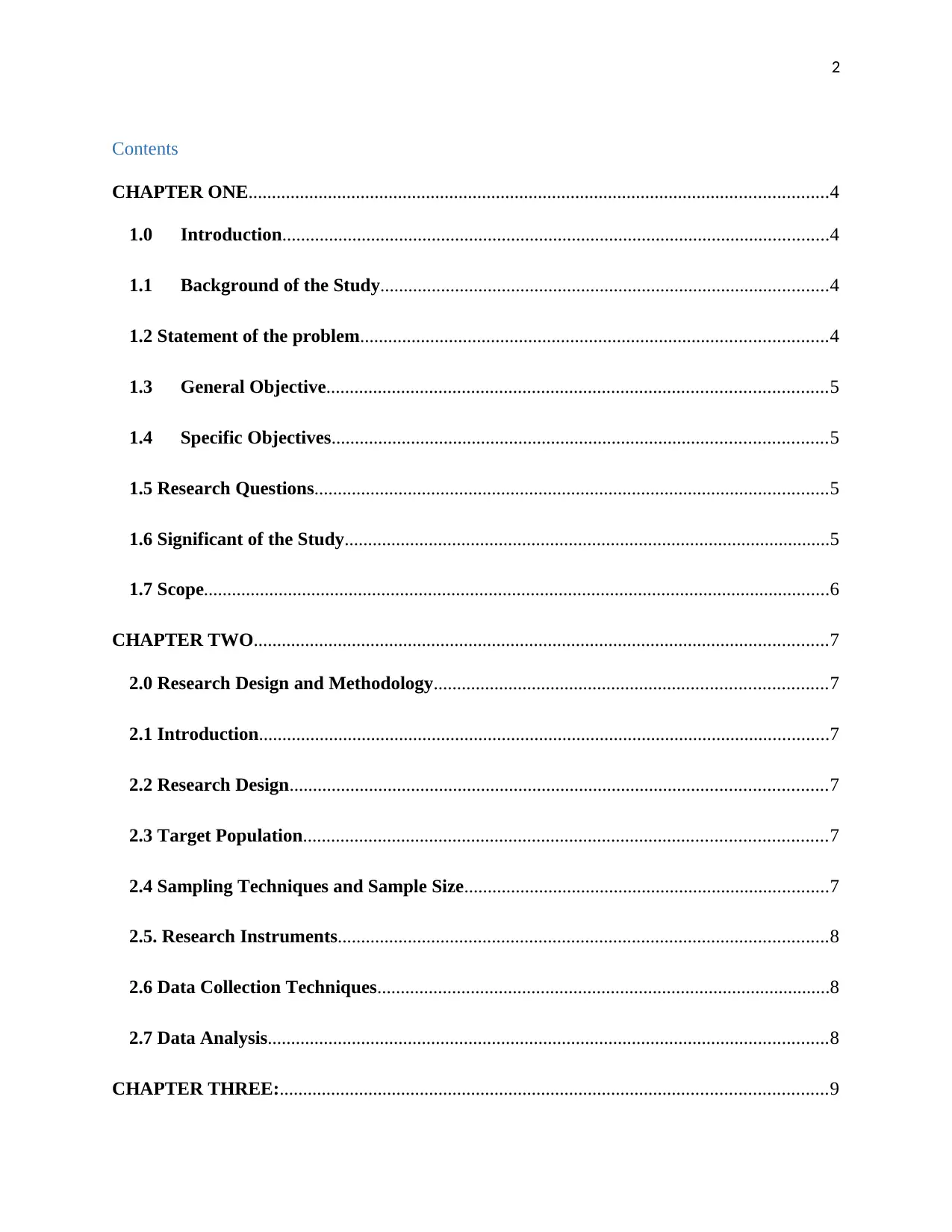
2
Contents
CHAPTER ONE............................................................................................................................4
1.0 Introduction.....................................................................................................................4
1.1 Background of the Study................................................................................................4
1.2 Statement of the problem....................................................................................................4
1.3 General Objective...........................................................................................................5
1.4 Specific Objectives..........................................................................................................5
1.5 Research Questions..............................................................................................................5
1.6 Significant of the Study........................................................................................................5
1.7 Scope......................................................................................................................................6
CHAPTER TWO...........................................................................................................................7
2.0 Research Design and Methodology....................................................................................7
2.1 Introduction..........................................................................................................................7
2.2 Research Design...................................................................................................................7
2.3 Target Population................................................................................................................7
2.4 Sampling Techniques and Sample Size..............................................................................7
2.5. Research Instruments.........................................................................................................8
2.6 Data Collection Techniques.................................................................................................8
2.7 Data Analysis........................................................................................................................8
CHAPTER THREE:.....................................................................................................................9
Contents
CHAPTER ONE............................................................................................................................4
1.0 Introduction.....................................................................................................................4
1.1 Background of the Study................................................................................................4
1.2 Statement of the problem....................................................................................................4
1.3 General Objective...........................................................................................................5
1.4 Specific Objectives..........................................................................................................5
1.5 Research Questions..............................................................................................................5
1.6 Significant of the Study........................................................................................................5
1.7 Scope......................................................................................................................................6
CHAPTER TWO...........................................................................................................................7
2.0 Research Design and Methodology....................................................................................7
2.1 Introduction..........................................................................................................................7
2.2 Research Design...................................................................................................................7
2.3 Target Population................................................................................................................7
2.4 Sampling Techniques and Sample Size..............................................................................7
2.5. Research Instruments.........................................................................................................8
2.6 Data Collection Techniques.................................................................................................8
2.7 Data Analysis........................................................................................................................8
CHAPTER THREE:.....................................................................................................................9
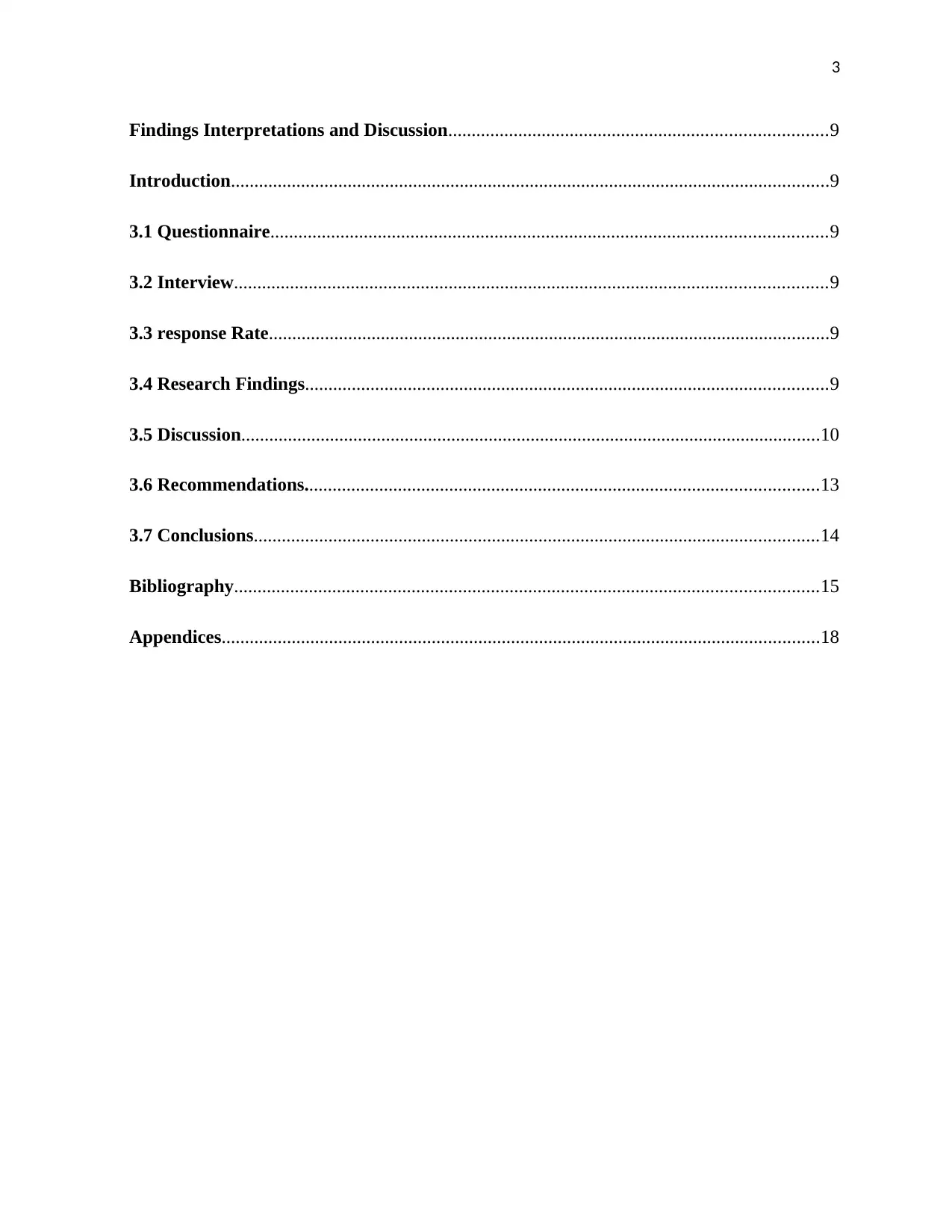
3
Findings Interpretations and Discussion.................................................................................9
Introduction................................................................................................................................9
3.1 Questionnaire.......................................................................................................................9
3.2 Interview...............................................................................................................................9
3.3 response Rate........................................................................................................................9
3.4 Research Findings................................................................................................................9
3.5 Discussion............................................................................................................................10
3.6 Recommendations..............................................................................................................13
3.7 Conclusions.........................................................................................................................14
Bibliography.............................................................................................................................15
Appendices................................................................................................................................18
Findings Interpretations and Discussion.................................................................................9
Introduction................................................................................................................................9
3.1 Questionnaire.......................................................................................................................9
3.2 Interview...............................................................................................................................9
3.3 response Rate........................................................................................................................9
3.4 Research Findings................................................................................................................9
3.5 Discussion............................................................................................................................10
3.6 Recommendations..............................................................................................................13
3.7 Conclusions.........................................................................................................................14
Bibliography.............................................................................................................................15
Appendices................................................................................................................................18
⊘ This is a preview!⊘
Do you want full access?
Subscribe today to unlock all pages.

Trusted by 1+ million students worldwide
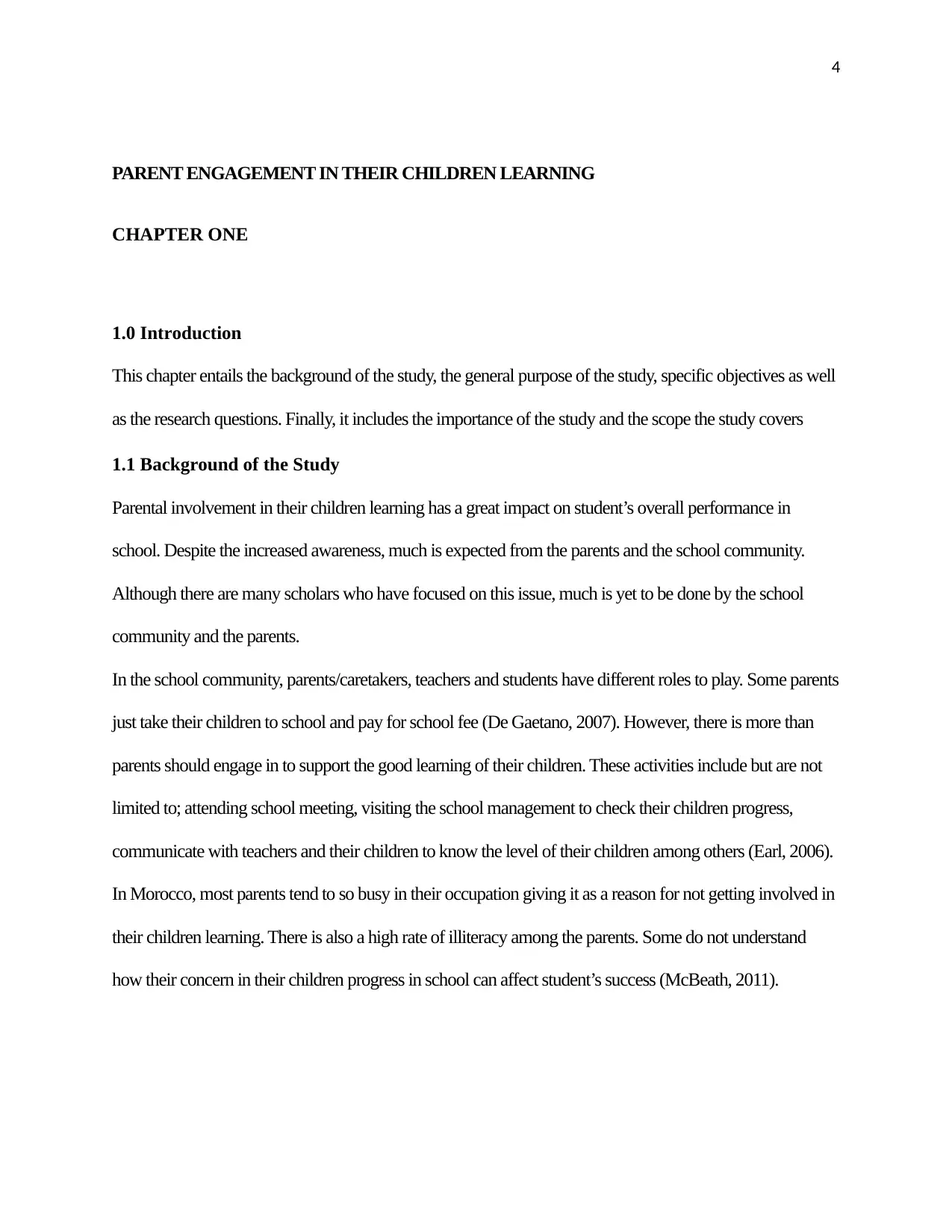
4
PARENT ENGAGEMENT IN THEIR CHILDREN LEARNING
CHAPTER ONE
1.0 Introduction
This chapter entails the background of the study, the general purpose of the study, specific objectives as well
as the research questions. Finally, it includes the importance of the study and the scope the study covers
1.1 Background of the Study
Parental involvement in their children learning has a great impact on student’s overall performance in
school. Despite the increased awareness, much is expected from the parents and the school community.
Although there are many scholars who have focused on this issue, much is yet to be done by the school
community and the parents.
In the school community, parents/caretakers, teachers and students have different roles to play. Some parents
just take their children to school and pay for school fee (De Gaetano, 2007). However, there is more than
parents should engage in to support the good learning of their children. These activities include but are not
limited to; attending school meeting, visiting the school management to check their children progress,
communicate with teachers and their children to know the level of their children among others (Earl, 2006).
In Morocco, most parents tend to so busy in their occupation giving it as a reason for not getting involved in
their children learning. There is also a high rate of illiteracy among the parents. Some do not understand
how their concern in their children progress in school can affect student’s success (McBeath, 2011).
PARENT ENGAGEMENT IN THEIR CHILDREN LEARNING
CHAPTER ONE
1.0 Introduction
This chapter entails the background of the study, the general purpose of the study, specific objectives as well
as the research questions. Finally, it includes the importance of the study and the scope the study covers
1.1 Background of the Study
Parental involvement in their children learning has a great impact on student’s overall performance in
school. Despite the increased awareness, much is expected from the parents and the school community.
Although there are many scholars who have focused on this issue, much is yet to be done by the school
community and the parents.
In the school community, parents/caretakers, teachers and students have different roles to play. Some parents
just take their children to school and pay for school fee (De Gaetano, 2007). However, there is more than
parents should engage in to support the good learning of their children. These activities include but are not
limited to; attending school meeting, visiting the school management to check their children progress,
communicate with teachers and their children to know the level of their children among others (Earl, 2006).
In Morocco, most parents tend to so busy in their occupation giving it as a reason for not getting involved in
their children learning. There is also a high rate of illiteracy among the parents. Some do not understand
how their concern in their children progress in school can affect student’s success (McBeath, 2011).
Paraphrase This Document
Need a fresh take? Get an instant paraphrase of this document with our AI Paraphraser
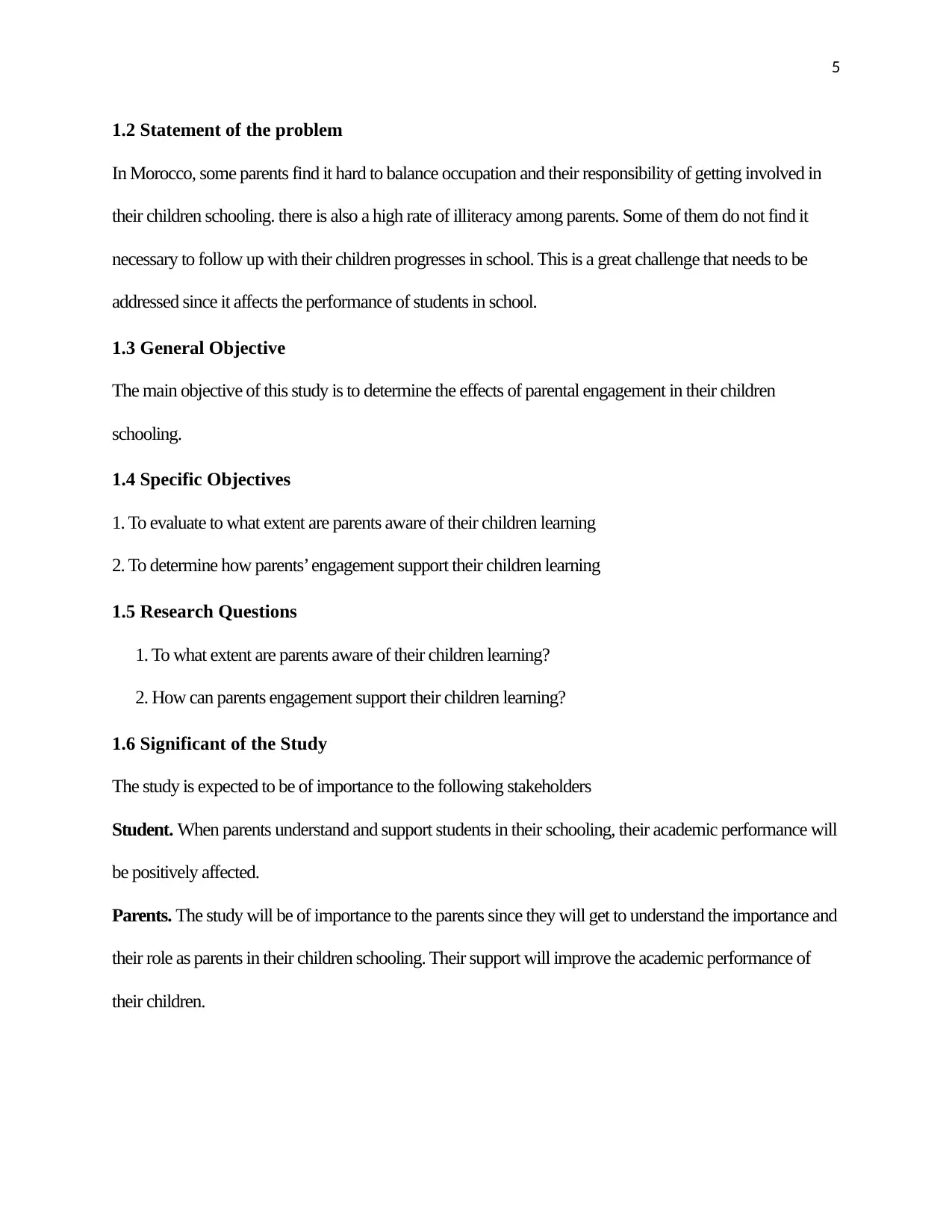
5
1.2 Statement of the problem
In Morocco, some parents find it hard to balance occupation and their responsibility of getting involved in
their children schooling. there is also a high rate of illiteracy among parents. Some of them do not find it
necessary to follow up with their children progresses in school. This is a great challenge that needs to be
addressed since it affects the performance of students in school.
1.3 General Objective
The main objective of this study is to determine the effects of parental engagement in their children
schooling.
1.4 Specific Objectives
1. To evaluate to what extent are parents aware of their children learning
2. To determine how parents’ engagement support their children learning
1.5 Research Questions
1. To what extent are parents aware of their children learning?
2. How can parents engagement support their children learning?
1.6 Significant of the Study
The study is expected to be of importance to the following stakeholders
Student. When parents understand and support students in their schooling, their academic performance will
be positively affected.
Parents. The study will be of importance to the parents since they will get to understand the importance and
their role as parents in their children schooling. Their support will improve the academic performance of
their children.
1.2 Statement of the problem
In Morocco, some parents find it hard to balance occupation and their responsibility of getting involved in
their children schooling. there is also a high rate of illiteracy among parents. Some of them do not find it
necessary to follow up with their children progresses in school. This is a great challenge that needs to be
addressed since it affects the performance of students in school.
1.3 General Objective
The main objective of this study is to determine the effects of parental engagement in their children
schooling.
1.4 Specific Objectives
1. To evaluate to what extent are parents aware of their children learning
2. To determine how parents’ engagement support their children learning
1.5 Research Questions
1. To what extent are parents aware of their children learning?
2. How can parents engagement support their children learning?
1.6 Significant of the Study
The study is expected to be of importance to the following stakeholders
Student. When parents understand and support students in their schooling, their academic performance will
be positively affected.
Parents. The study will be of importance to the parents since they will get to understand the importance and
their role as parents in their children schooling. Their support will improve the academic performance of
their children.
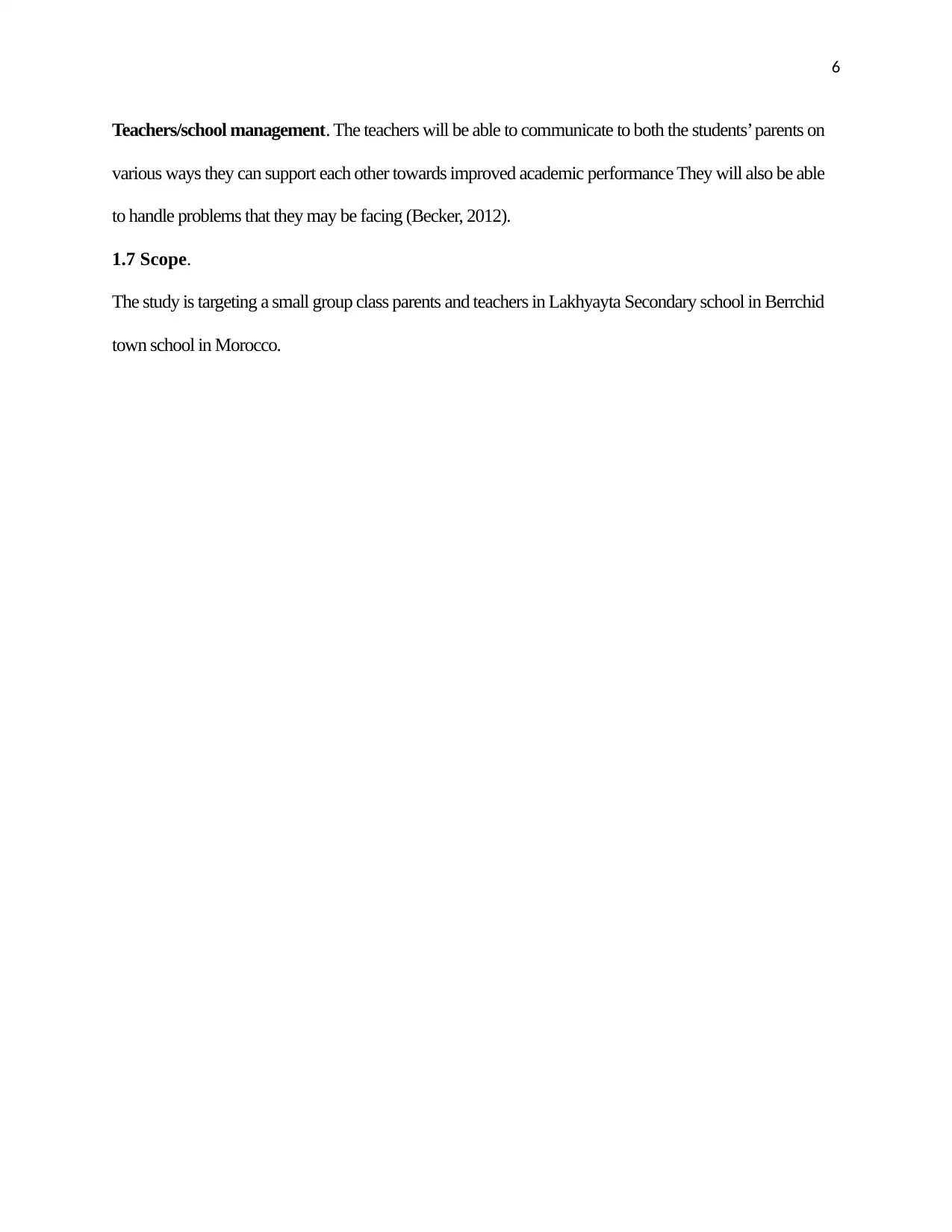
6
Teachers/school management. The teachers will be able to communicate to both the students’ parents on
various ways they can support each other towards improved academic performance They will also be able
to handle problems that they may be facing (Becker, 2012).
1.7 Scope.
The study is targeting a small group class parents and teachers in Lakhyayta Secondary school in Berrchid
town school in Morocco.
Teachers/school management. The teachers will be able to communicate to both the students’ parents on
various ways they can support each other towards improved academic performance They will also be able
to handle problems that they may be facing (Becker, 2012).
1.7 Scope.
The study is targeting a small group class parents and teachers in Lakhyayta Secondary school in Berrchid
town school in Morocco.
⊘ This is a preview!⊘
Do you want full access?
Subscribe today to unlock all pages.

Trusted by 1+ million students worldwide
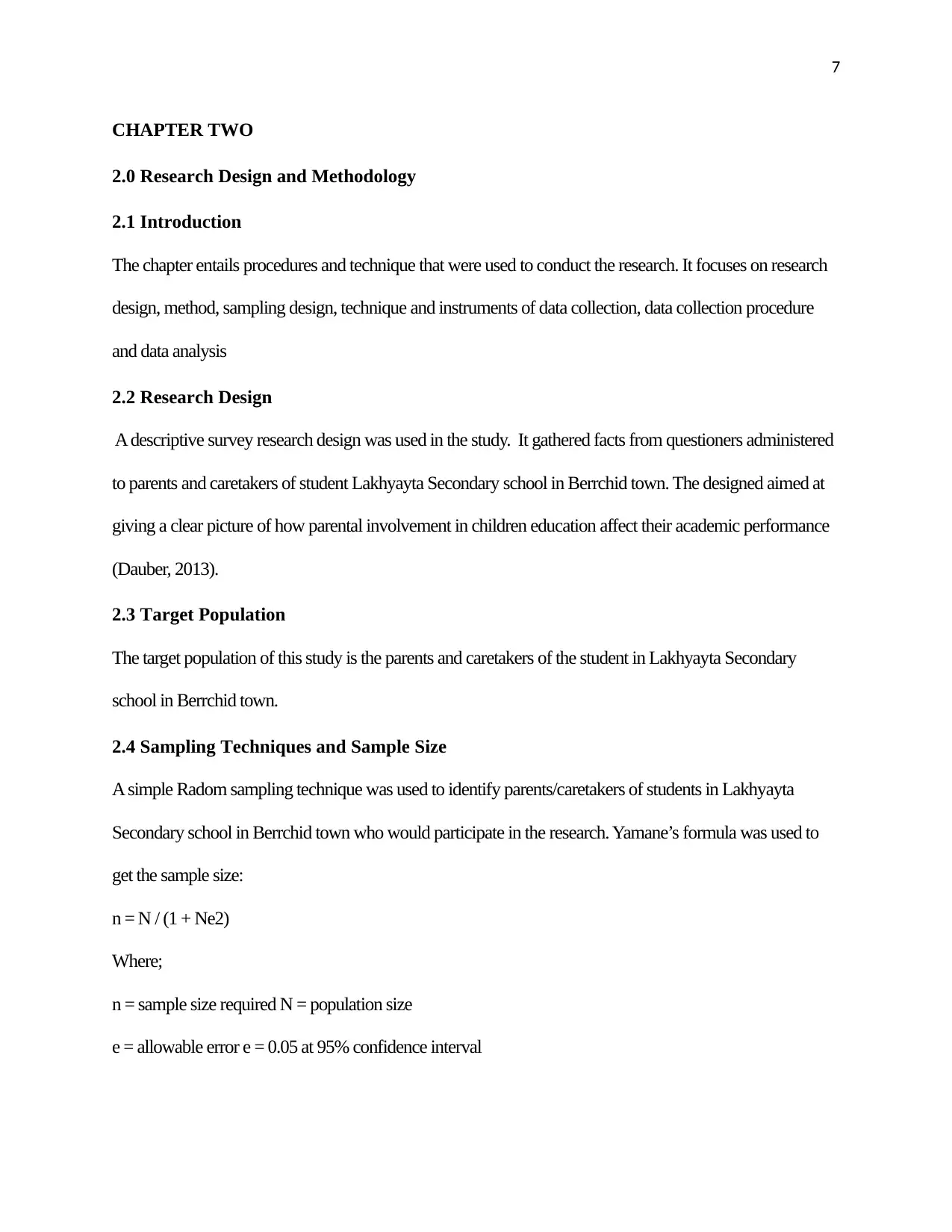
7
CHAPTER TWO
2.0 Research Design and Methodology
2.1 Introduction
The chapter entails procedures and technique that were used to conduct the research. It focuses on research
design, method, sampling design, technique and instruments of data collection, data collection procedure
and data analysis
2.2 Research Design
A descriptive survey research design was used in the study. It gathered facts from questioners administered
to parents and caretakers of student Lakhyayta Secondary school in Berrchid town. The designed aimed at
giving a clear picture of how parental involvement in children education affect their academic performance
(Dauber, 2013).
2.3 Target Population
The target population of this study is the parents and caretakers of the student in Lakhyayta Secondary
school in Berrchid town.
2.4 Sampling Techniques and Sample Size
A simple Radom sampling technique was used to identify parents/caretakers of students in Lakhyayta
Secondary school in Berrchid town who would participate in the research. Yamane’s formula was used to
get the sample size:
n = N / (1 + Ne2)
Where;
n = sample size required N = population size
e = allowable error e = 0.05 at 95% confidence interval
CHAPTER TWO
2.0 Research Design and Methodology
2.1 Introduction
The chapter entails procedures and technique that were used to conduct the research. It focuses on research
design, method, sampling design, technique and instruments of data collection, data collection procedure
and data analysis
2.2 Research Design
A descriptive survey research design was used in the study. It gathered facts from questioners administered
to parents and caretakers of student Lakhyayta Secondary school in Berrchid town. The designed aimed at
giving a clear picture of how parental involvement in children education affect their academic performance
(Dauber, 2013).
2.3 Target Population
The target population of this study is the parents and caretakers of the student in Lakhyayta Secondary
school in Berrchid town.
2.4 Sampling Techniques and Sample Size
A simple Radom sampling technique was used to identify parents/caretakers of students in Lakhyayta
Secondary school in Berrchid town who would participate in the research. Yamane’s formula was used to
get the sample size:
n = N / (1 + Ne2)
Where;
n = sample size required N = population size
e = allowable error e = 0.05 at 95% confidence interval
Paraphrase This Document
Need a fresh take? Get an instant paraphrase of this document with our AI Paraphraser
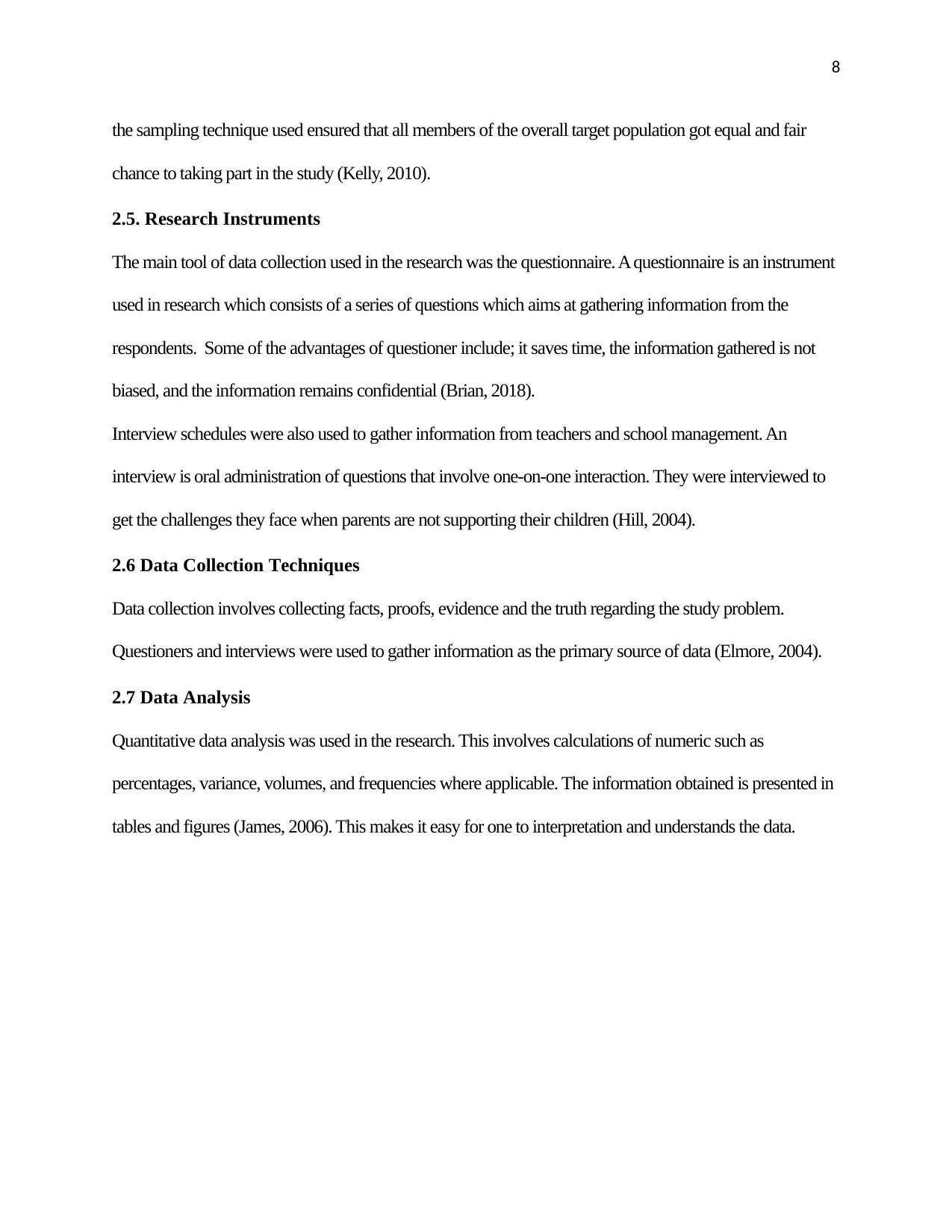
8
the sampling technique used ensured that all members of the overall target population got equal and fair
chance to taking part in the study (Kelly, 2010).
2.5. Research Instruments
The main tool of data collection used in the research was the questionnaire. A questionnaire is an instrument
used in research which consists of a series of questions which aims at gathering information from the
respondents. Some of the advantages of questioner include; it saves time, the information gathered is not
biased, and the information remains confidential (Brian, 2018).
Interview schedules were also used to gather information from teachers and school management. An
interview is oral administration of questions that involve one-on-one interaction. They were interviewed to
get the challenges they face when parents are not supporting their children (Hill, 2004).
2.6 Data Collection Techniques
Data collection involves collecting facts, proofs, evidence and the truth regarding the study problem.
Questioners and interviews were used to gather information as the primary source of data (Elmore, 2004).
2.7 Data Analysis
Quantitative data analysis was used in the research. This involves calculations of numeric such as
percentages, variance, volumes, and frequencies where applicable. The information obtained is presented in
tables and figures (James, 2006). This makes it easy for one to interpretation and understands the data.
the sampling technique used ensured that all members of the overall target population got equal and fair
chance to taking part in the study (Kelly, 2010).
2.5. Research Instruments
The main tool of data collection used in the research was the questionnaire. A questionnaire is an instrument
used in research which consists of a series of questions which aims at gathering information from the
respondents. Some of the advantages of questioner include; it saves time, the information gathered is not
biased, and the information remains confidential (Brian, 2018).
Interview schedules were also used to gather information from teachers and school management. An
interview is oral administration of questions that involve one-on-one interaction. They were interviewed to
get the challenges they face when parents are not supporting their children (Hill, 2004).
2.6 Data Collection Techniques
Data collection involves collecting facts, proofs, evidence and the truth regarding the study problem.
Questioners and interviews were used to gather information as the primary source of data (Elmore, 2004).
2.7 Data Analysis
Quantitative data analysis was used in the research. This involves calculations of numeric such as
percentages, variance, volumes, and frequencies where applicable. The information obtained is presented in
tables and figures (James, 2006). This makes it easy for one to interpretation and understands the data.
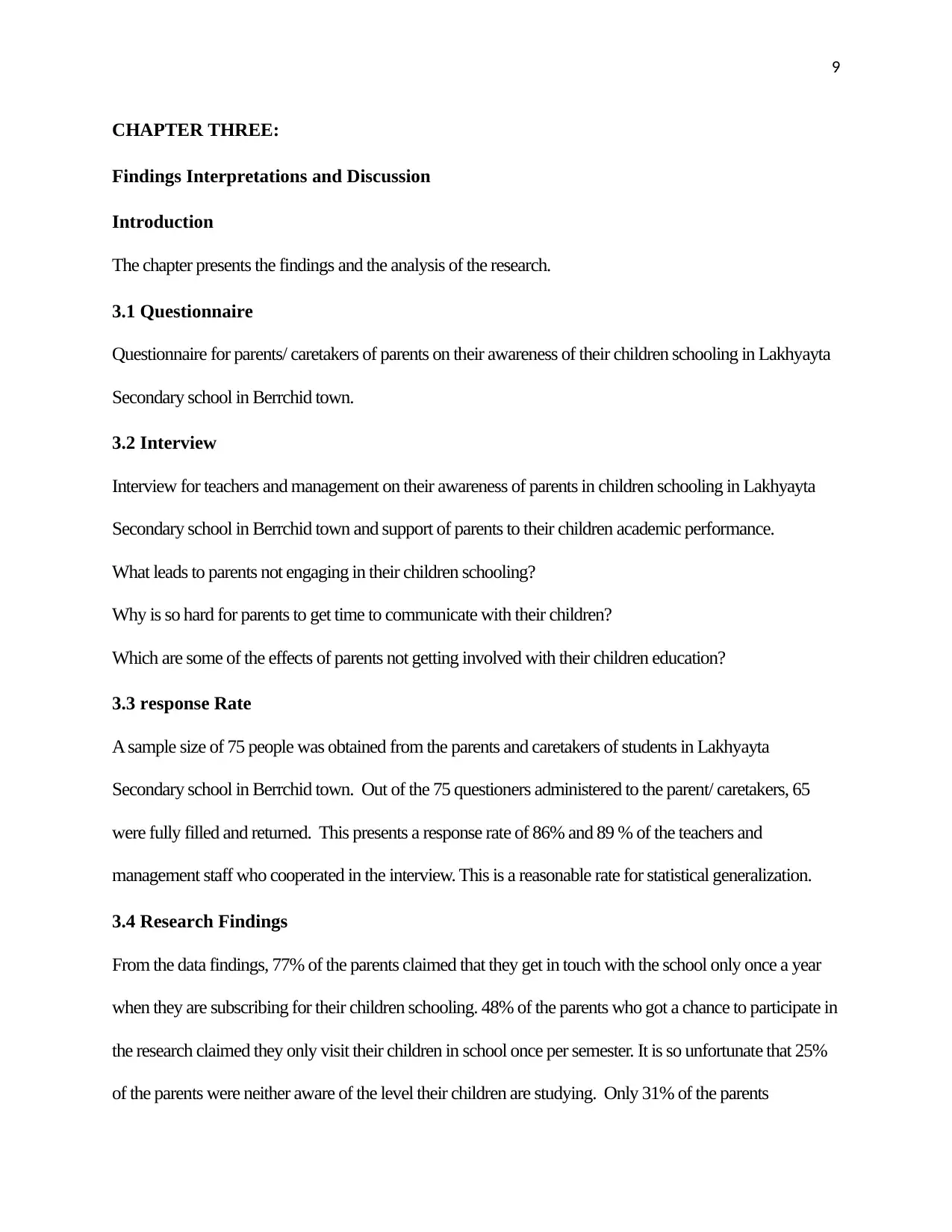
9
CHAPTER THREE:
Findings Interpretations and Discussion
Introduction
The chapter presents the findings and the analysis of the research.
3.1 Questionnaire
Questionnaire for parents/ caretakers of parents on their awareness of their children schooling in Lakhyayta
Secondary school in Berrchid town.
3.2 Interview
Interview for teachers and management on their awareness of parents in children schooling in Lakhyayta
Secondary school in Berrchid town and support of parents to their children academic performance.
What leads to parents not engaging in their children schooling?
Why is so hard for parents to get time to communicate with their children?
Which are some of the effects of parents not getting involved with their children education?
3.3 response Rate
A sample size of 75 people was obtained from the parents and caretakers of students in Lakhyayta
Secondary school in Berrchid town. Out of the 75 questioners administered to the parent/ caretakers, 65
were fully filled and returned. This presents a response rate of 86% and 89 % of the teachers and
management staff who cooperated in the interview. This is a reasonable rate for statistical generalization.
3.4 Research Findings
From the data findings, 77% of the parents claimed that they get in touch with the school only once a year
when they are subscribing for their children schooling. 48% of the parents who got a chance to participate in
the research claimed they only visit their children in school once per semester. It is so unfortunate that 25%
of the parents were neither aware of the level their children are studying. Only 31% of the parents
CHAPTER THREE:
Findings Interpretations and Discussion
Introduction
The chapter presents the findings and the analysis of the research.
3.1 Questionnaire
Questionnaire for parents/ caretakers of parents on their awareness of their children schooling in Lakhyayta
Secondary school in Berrchid town.
3.2 Interview
Interview for teachers and management on their awareness of parents in children schooling in Lakhyayta
Secondary school in Berrchid town and support of parents to their children academic performance.
What leads to parents not engaging in their children schooling?
Why is so hard for parents to get time to communicate with their children?
Which are some of the effects of parents not getting involved with their children education?
3.3 response Rate
A sample size of 75 people was obtained from the parents and caretakers of students in Lakhyayta
Secondary school in Berrchid town. Out of the 75 questioners administered to the parent/ caretakers, 65
were fully filled and returned. This presents a response rate of 86% and 89 % of the teachers and
management staff who cooperated in the interview. This is a reasonable rate for statistical generalization.
3.4 Research Findings
From the data findings, 77% of the parents claimed that they get in touch with the school only once a year
when they are subscribing for their children schooling. 48% of the parents who got a chance to participate in
the research claimed they only visit their children in school once per semester. It is so unfortunate that 25%
of the parents were neither aware of the level their children are studying. Only 31% of the parents
⊘ This is a preview!⊘
Do you want full access?
Subscribe today to unlock all pages.

Trusted by 1+ million students worldwide
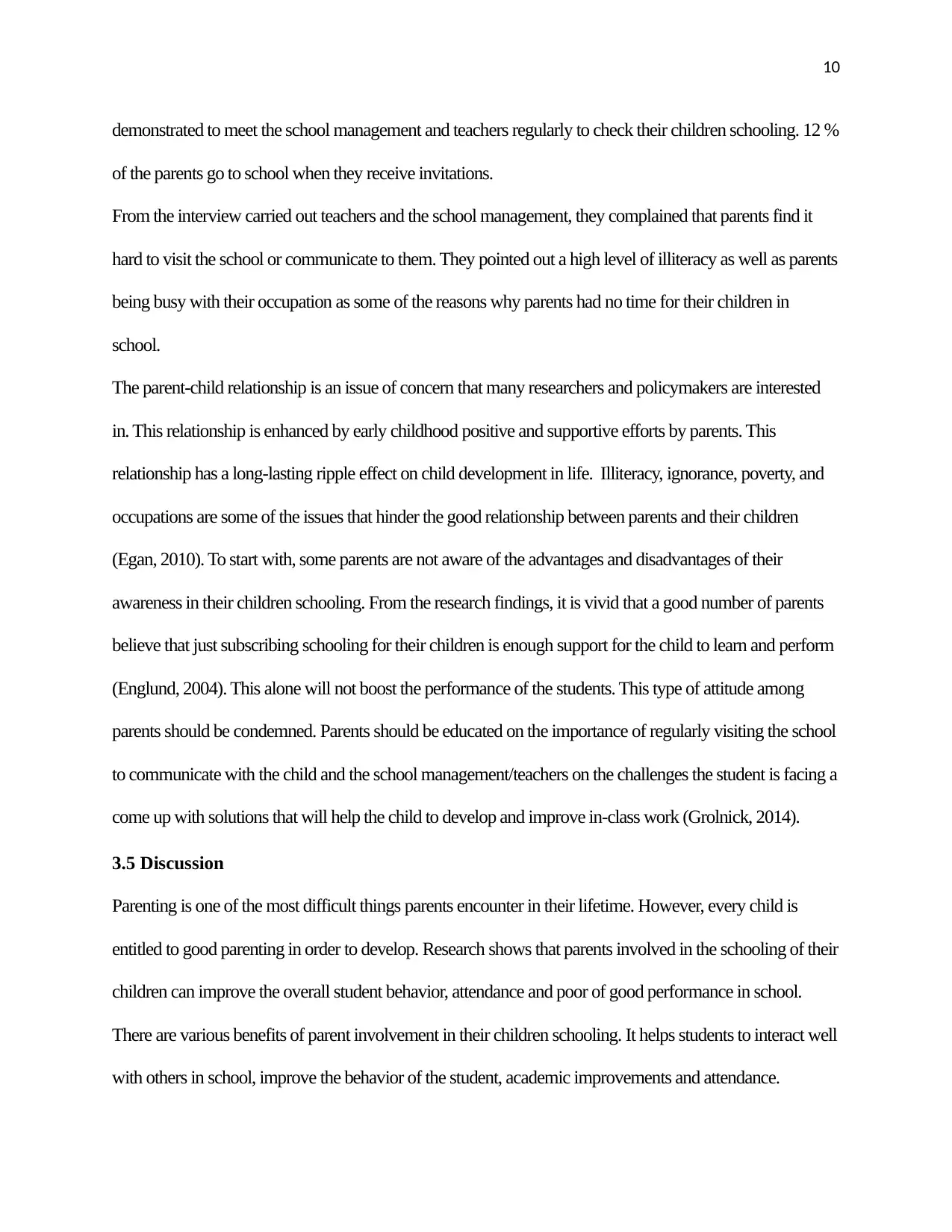
10
demonstrated to meet the school management and teachers regularly to check their children schooling. 12 %
of the parents go to school when they receive invitations.
From the interview carried out teachers and the school management, they complained that parents find it
hard to visit the school or communicate to them. They pointed out a high level of illiteracy as well as parents
being busy with their occupation as some of the reasons why parents had no time for their children in
school.
The parent-child relationship is an issue of concern that many researchers and policymakers are interested
in. This relationship is enhanced by early childhood positive and supportive efforts by parents. This
relationship has a long-lasting ripple effect on child development in life. Illiteracy, ignorance, poverty, and
occupations are some of the issues that hinder the good relationship between parents and their children
(Egan, 2010). To start with, some parents are not aware of the advantages and disadvantages of their
awareness in their children schooling. From the research findings, it is vivid that a good number of parents
believe that just subscribing schooling for their children is enough support for the child to learn and perform
(Englund, 2004). This alone will not boost the performance of the students. This type of attitude among
parents should be condemned. Parents should be educated on the importance of regularly visiting the school
to communicate with the child and the school management/teachers on the challenges the student is facing a
come up with solutions that will help the child to develop and improve in-class work (Grolnick, 2014).
3.5 Discussion
Parenting is one of the most difficult things parents encounter in their lifetime. However, every child is
entitled to good parenting in order to develop. Research shows that parents involved in the schooling of their
children can improve the overall student behavior, attendance and poor of good performance in school.
There are various benefits of parent involvement in their children schooling. It helps students to interact well
with others in school, improve the behavior of the student, academic improvements and attendance.
demonstrated to meet the school management and teachers regularly to check their children schooling. 12 %
of the parents go to school when they receive invitations.
From the interview carried out teachers and the school management, they complained that parents find it
hard to visit the school or communicate to them. They pointed out a high level of illiteracy as well as parents
being busy with their occupation as some of the reasons why parents had no time for their children in
school.
The parent-child relationship is an issue of concern that many researchers and policymakers are interested
in. This relationship is enhanced by early childhood positive and supportive efforts by parents. This
relationship has a long-lasting ripple effect on child development in life. Illiteracy, ignorance, poverty, and
occupations are some of the issues that hinder the good relationship between parents and their children
(Egan, 2010). To start with, some parents are not aware of the advantages and disadvantages of their
awareness in their children schooling. From the research findings, it is vivid that a good number of parents
believe that just subscribing schooling for their children is enough support for the child to learn and perform
(Englund, 2004). This alone will not boost the performance of the students. This type of attitude among
parents should be condemned. Parents should be educated on the importance of regularly visiting the school
to communicate with the child and the school management/teachers on the challenges the student is facing a
come up with solutions that will help the child to develop and improve in-class work (Grolnick, 2014).
3.5 Discussion
Parenting is one of the most difficult things parents encounter in their lifetime. However, every child is
entitled to good parenting in order to develop. Research shows that parents involved in the schooling of their
children can improve the overall student behavior, attendance and poor of good performance in school.
There are various benefits of parent involvement in their children schooling. It helps students to interact well
with others in school, improve the behavior of the student, academic improvements and attendance.
Paraphrase This Document
Need a fresh take? Get an instant paraphrase of this document with our AI Paraphraser
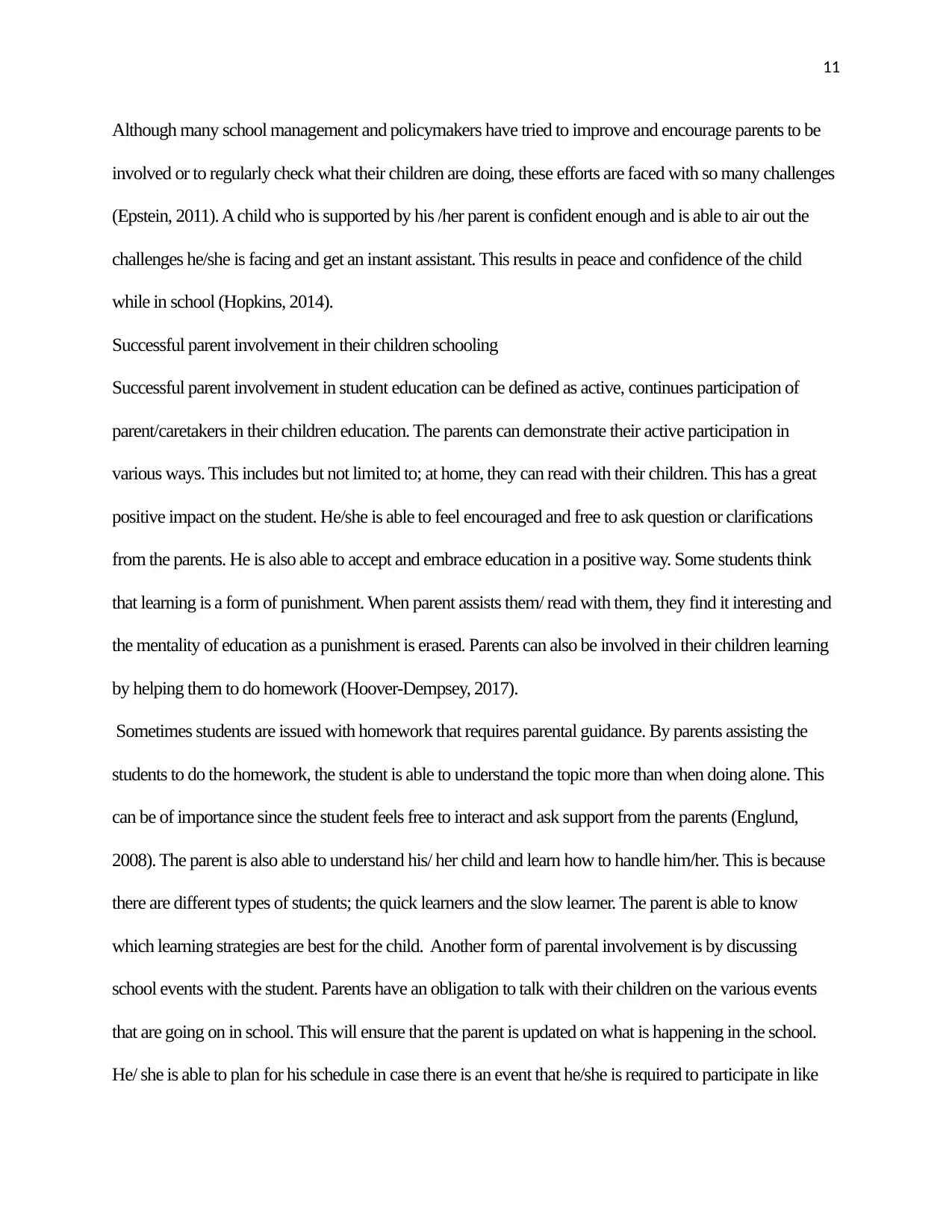
11
Although many school management and policymakers have tried to improve and encourage parents to be
involved or to regularly check what their children are doing, these efforts are faced with so many challenges
(Epstein, 2011). A child who is supported by his /her parent is confident enough and is able to air out the
challenges he/she is facing and get an instant assistant. This results in peace and confidence of the child
while in school (Hopkins, 2014).
Successful parent involvement in their children schooling
Successful parent involvement in student education can be defined as active, continues participation of
parent/caretakers in their children education. The parents can demonstrate their active participation in
various ways. This includes but not limited to; at home, they can read with their children. This has a great
positive impact on the student. He/she is able to feel encouraged and free to ask question or clarifications
from the parents. He is also able to accept and embrace education in a positive way. Some students think
that learning is a form of punishment. When parent assists them/ read with them, they find it interesting and
the mentality of education as a punishment is erased. Parents can also be involved in their children learning
by helping them to do homework (Hoover-Dempsey, 2017).
Sometimes students are issued with homework that requires parental guidance. By parents assisting the
students to do the homework, the student is able to understand the topic more than when doing alone. This
can be of importance since the student feels free to interact and ask support from the parents (Englund,
2008). The parent is also able to understand his/ her child and learn how to handle him/her. This is because
there are different types of students; the quick learners and the slow learner. The parent is able to know
which learning strategies are best for the child. Another form of parental involvement is by discussing
school events with the student. Parents have an obligation to talk with their children on the various events
that are going on in school. This will ensure that the parent is updated on what is happening in the school.
He/ she is able to plan for his schedule in case there is an event that he/she is required to participate in like
Although many school management and policymakers have tried to improve and encourage parents to be
involved or to regularly check what their children are doing, these efforts are faced with so many challenges
(Epstein, 2011). A child who is supported by his /her parent is confident enough and is able to air out the
challenges he/she is facing and get an instant assistant. This results in peace and confidence of the child
while in school (Hopkins, 2014).
Successful parent involvement in their children schooling
Successful parent involvement in student education can be defined as active, continues participation of
parent/caretakers in their children education. The parents can demonstrate their active participation in
various ways. This includes but not limited to; at home, they can read with their children. This has a great
positive impact on the student. He/she is able to feel encouraged and free to ask question or clarifications
from the parents. He is also able to accept and embrace education in a positive way. Some students think
that learning is a form of punishment. When parent assists them/ read with them, they find it interesting and
the mentality of education as a punishment is erased. Parents can also be involved in their children learning
by helping them to do homework (Hoover-Dempsey, 2017).
Sometimes students are issued with homework that requires parental guidance. By parents assisting the
students to do the homework, the student is able to understand the topic more than when doing alone. This
can be of importance since the student feels free to interact and ask support from the parents (Englund,
2008). The parent is also able to understand his/ her child and learn how to handle him/her. This is because
there are different types of students; the quick learners and the slow learner. The parent is able to know
which learning strategies are best for the child. Another form of parental involvement is by discussing
school events with the student. Parents have an obligation to talk with their children on the various events
that are going on in school. This will ensure that the parent is updated on what is happening in the school.
He/ she is able to plan for his schedule in case there is an event that he/she is required to participate in like
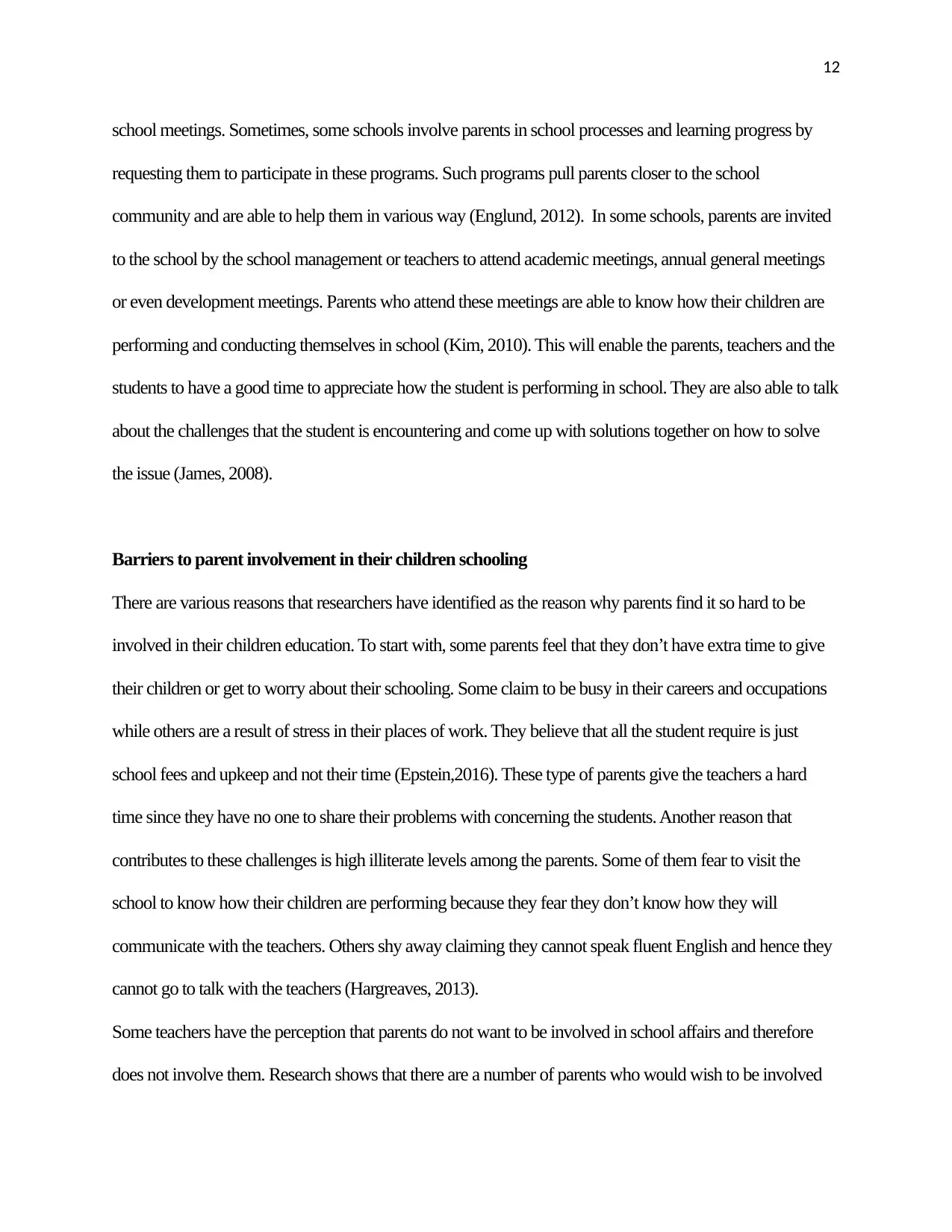
12
school meetings. Sometimes, some schools involve parents in school processes and learning progress by
requesting them to participate in these programs. Such programs pull parents closer to the school
community and are able to help them in various way (Englund, 2012). In some schools, parents are invited
to the school by the school management or teachers to attend academic meetings, annual general meetings
or even development meetings. Parents who attend these meetings are able to know how their children are
performing and conducting themselves in school (Kim, 2010). This will enable the parents, teachers and the
students to have a good time to appreciate how the student is performing in school. They are also able to talk
about the challenges that the student is encountering and come up with solutions together on how to solve
the issue (James, 2008).
Barriers to parent involvement in their children schooling
There are various reasons that researchers have identified as the reason why parents find it so hard to be
involved in their children education. To start with, some parents feel that they don’t have extra time to give
their children or get to worry about their schooling. Some claim to be busy in their careers and occupations
while others are a result of stress in their places of work. They believe that all the student require is just
school fees and upkeep and not their time (Epstein,2016). These type of parents give the teachers a hard
time since they have no one to share their problems with concerning the students. Another reason that
contributes to these challenges is high illiterate levels among the parents. Some of them fear to visit the
school to know how their children are performing because they fear they don’t know how they will
communicate with the teachers. Others shy away claiming they cannot speak fluent English and hence they
cannot go to talk with the teachers (Hargreaves, 2013).
Some teachers have the perception that parents do not want to be involved in school affairs and therefore
does not involve them. Research shows that there are a number of parents who would wish to be involved
school meetings. Sometimes, some schools involve parents in school processes and learning progress by
requesting them to participate in these programs. Such programs pull parents closer to the school
community and are able to help them in various way (Englund, 2012). In some schools, parents are invited
to the school by the school management or teachers to attend academic meetings, annual general meetings
or even development meetings. Parents who attend these meetings are able to know how their children are
performing and conducting themselves in school (Kim, 2010). This will enable the parents, teachers and the
students to have a good time to appreciate how the student is performing in school. They are also able to talk
about the challenges that the student is encountering and come up with solutions together on how to solve
the issue (James, 2008).
Barriers to parent involvement in their children schooling
There are various reasons that researchers have identified as the reason why parents find it so hard to be
involved in their children education. To start with, some parents feel that they don’t have extra time to give
their children or get to worry about their schooling. Some claim to be busy in their careers and occupations
while others are a result of stress in their places of work. They believe that all the student require is just
school fees and upkeep and not their time (Epstein,2016). These type of parents give the teachers a hard
time since they have no one to share their problems with concerning the students. Another reason that
contributes to these challenges is high illiterate levels among the parents. Some of them fear to visit the
school to know how their children are performing because they fear they don’t know how they will
communicate with the teachers. Others shy away claiming they cannot speak fluent English and hence they
cannot go to talk with the teachers (Hargreaves, 2013).
Some teachers have the perception that parents do not want to be involved in school affairs and therefore
does not involve them. Research shows that there are a number of parents who would wish to be involved
⊘ This is a preview!⊘
Do you want full access?
Subscribe today to unlock all pages.

Trusted by 1+ million students worldwide
1 out of 19
Related Documents
Your All-in-One AI-Powered Toolkit for Academic Success.
+13062052269
info@desklib.com
Available 24*7 on WhatsApp / Email
![[object Object]](/_next/static/media/star-bottom.7253800d.svg)
Unlock your academic potential
Copyright © 2020–2026 A2Z Services. All Rights Reserved. Developed and managed by ZUCOL.





